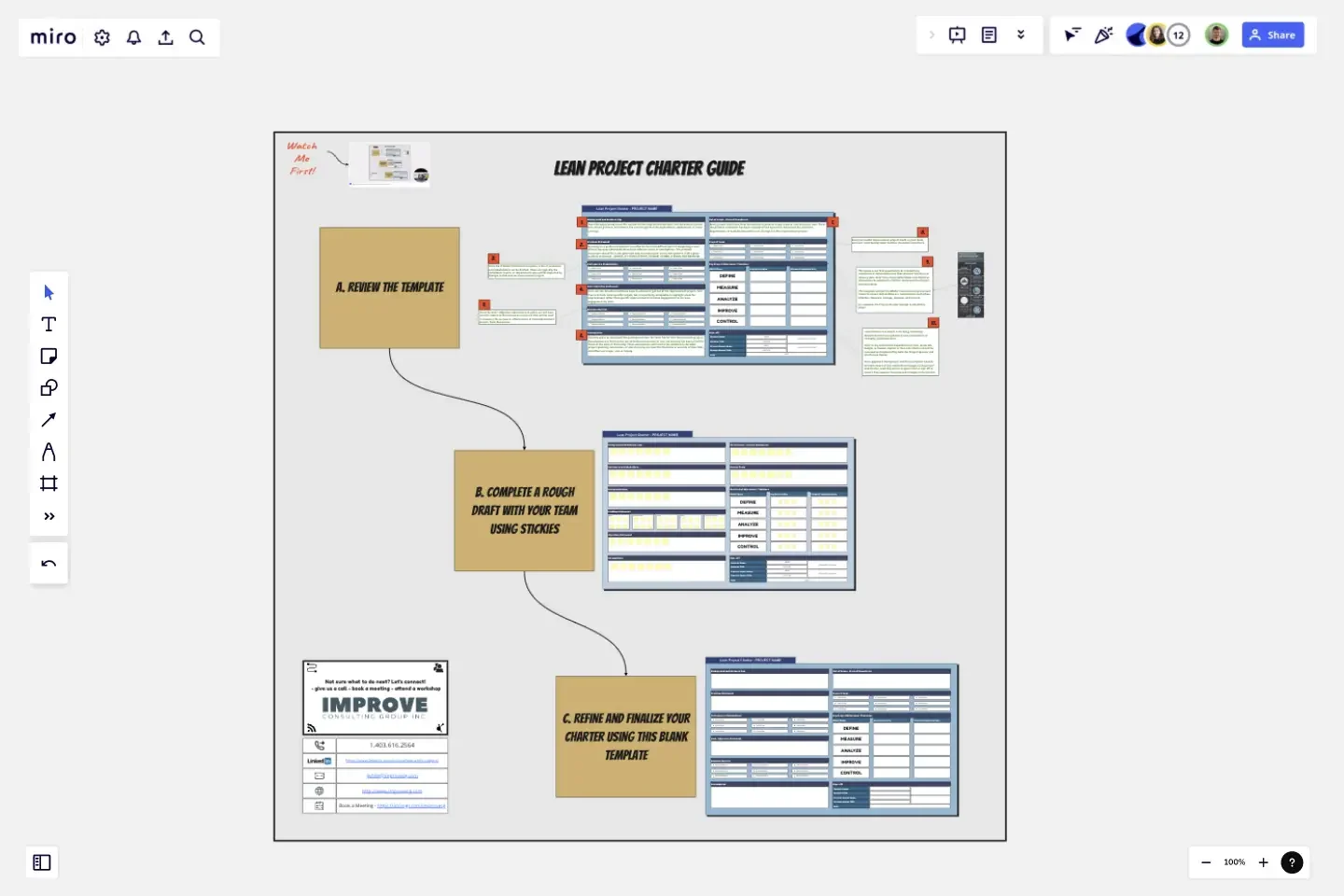Lean Project Charter
Project Charters are an essential element to any project, as they ensure the project team is able to describe all relevant project details.
About the template
The Lean Project Charter does all this in one easy space, and leveraging the power of Miro, you can now complete a charter with your team in no time and ensure everyone is on the same page for what we want to do, and how we will do it, and who needs to be involved.
This Miro submission includes an easy to follow three part template, with the first part introducing the 10 elements to this Lean Project Charter and a description for each element. This includes:
Background and Business Gap
Problem Statement
Customers and Stakeholders
Goals or Objective Statement
Business Metrics
Assumptions
Out of Scope or Project Boundaries
Project Team
Key Project Milestones and timelines
And Sign Off
Next, there is a brainstorming template complete with sticky notes so you and your team can get all of your ideas captured easily. And finally, there is a blank template where you can develop your final charter in preparation for sign off by the appropriate senior resources.
Get your team on the same page using the Lean Project Charter and you can collaboratively plan out your project activities while ensuring that you deliver exactly what was expected of your team.
This template was created by Hiro Studio.
Get started with this template right now.
Reflection Island: End of Year Team Retro
Works best for:
Retrospectives, Agile Methodology, Meetings
The Reflection Island: End of Year Team Retro template offers a creative and themed approach to retrospectives, perfect for wrapping up the year. It provides elements for reflecting on achievements, challenges, and goals using a tropical island theme. This template enables teams to celebrate successes, learn from setbacks, and set intentions for the upcoming year in a relaxed and enjoyable atmosphere. By promoting reflection and celebration, the Reflection Island: End of Year Team Retro empowers teams to strengthen bonds, boost morale, and start the new year with renewed energy and focus effectively.
Sailboat Retro
Works best for:
Retrospectives, Agile Methodology, Meetings
The Sailboat Retrospective template offers a metaphorical journey through past iterations and future goals, likening the retrospective process to sailing a boat. It provides elements for identifying driving forces (winds), restraining forces (anchors), and destination (goal). This template enables teams to reflect on what propels them forward, what holds them back, and where they want to go next. By promoting visualization and metaphorical thinking, the Sailboat Retrospective empowers teams to navigate challenges, set sail towards their objectives, and steer towards success effectively.
Canvas Playground Template
Works best for:
Templates
The canvas playground template is the ultimate way to explore all the features that make up Miro's Intelligent Canvas. This dynamic and interactive space is designed to help you get work done faster while engaging your team. From AI creation and Sidekicks to intelligent widgets, this template allows you to try it all and discover how these capabilities can streamline your workflow and enhance collaboration.
PI Planning Template
Works best for:
PI Planning, Product Management
The Miro PI Planning Template streamlines the Program Increment planning process for Agile teams. It facilitates a collaborative environment, enabling teams to efficiently align on strategies, identify dependencies, and convert decisions into actionable tasks. With features like real-time collaboration, Jira integration, and a centralized workspace, the template supports teams in enhancing efficiency, engagement, and decision-making.
SAFe Roam Board
Works best for:
Agile Methodology, Operations, Agile Workflows
A SAFe ROAM Board is a framework for making risks visible. It gives you and your team a shared space to notice and highlight risks, so they don’t get ignored. The ROAM Board helps everyone consider the likelihood and impact of risks, and decide which risks are low priority versus high priority. The underlying principles of SAFe (Scaled Agile Framework) are: drive cost-effective solutions, apply systems thinking, assume that things will change, build incrementally, base milestones on evaluating working systems, and visualize and limit works in progress.
The Hot Air Balloon Retrospective
The Hot Air Balloon is a simple activity for helping the team identify things that makes them move faster, and things that slow them down.
